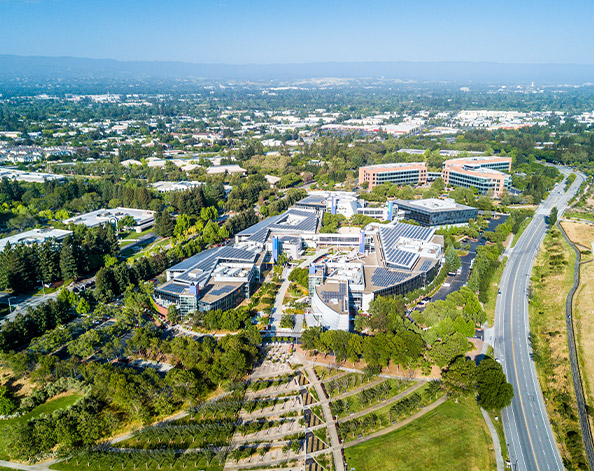Why Silicon Valley is so successful
If the youth are our future, then our young professionals are best poised to showcase South Africa as an investment destination to the rest of the world. That is the position of Business Leadership SA (BLSA) and Kerry Singh de Sousa and Sthembile Nkabinde of Investec were chosen to be part of task team of young professionals to represent South Africa on an investment roadshow to Silicon Valley.
The initiative matched President Cyril Ramaphosa’s call earlier in the year for young entrepreneurs to invest in Africa.
Silicon Valley, in San Francisco, is the global babylon of high-tech and start-ups. Of the world’s almost 150 billionaires, half live here.
It is a fertile valley to look for investors and learn about innovation. The delegation was determined to make the most of the opportunity. During the trip, Kerry and Sthembile expanded their network and worked to encourage foreign direct investment to the tip of Africa.

The bridge to success – what South Africa can learn for a global tech babylon.
SA has a lot to offer investors
“We remain the most established economy and the gateway to the rest of Africa,” she says. “We have a strong judicial system, political stability, a trainable workforce and abundant resources.”
Kerry Singh de Sousa, a consultant in Investec Corporate and Institutional Banking, believes South Africa is a resilient nation with a lot to offer.
The country also has a young population (37% is under 35 years of age). Moreover, she says, we are also a recognised tech hub.
“We are known to be pioneers in the medical field, from the first heart transplant to recent groundbreaking ear surgery. We also have the SKA telescope and encourage exploration in science and maths.”
Silicon Valley has a spirit of collaboration and co-operation
She believes South Africa can play well on a global commercial stage. During her trip to Northern California, Kerry was keen to find out ‘why’ Silicon Valley works.
“While we have pockets of innovation here in South Africa, it’s not on the same scale as Silicon Valley,” she says. “We are unique and we have to become our own heroes, but we have to create greater scale and reach to solve problems like unemployment.”
She believes we can solve our present challenges at home through technology and innovation. “However, collaboration is key. We need to work together to start mobilising and bringing technology and people together to find the answers.”
If you’re not failing, you’re not growing
“On the negative side,” she adds, “as young people, we have been taught that failure is the worst thing ever. In Silicon Valley, you are encouraged to fail fast and fail often. In fact, it is seen as a badge of honour.”
In Silicon Valley, you are encouraged to fail fast and fail often. In fact, it is seen as a badge of honour.
For example, Google’s Moonshot X division believes failure is essential in getting to workable ideas. Angel investors, as another example, will invest in five projects before they strike it lucky with a profitable business or idea.
The concept of iteration and testing – or rapid evaluation –is to try and constantly generate new ideas. “The message here is simple – if you’re not failing, you’re not growing.”
“We need to find an environment where failure has as much value attached to it as success or self-promotion.”
The future is female
However, as much as she was dazzled by Silicon Valley, she was also surprised by the slow pace of transformation. “Some 90% of the leadership is male dominated.”
“And as only 5% of leadership positions are held by women, diversity is possibly a challenge,” she says. “We know that the more diverse a board, the better the internal rate of return.”
The internal rate of return is a measure of an investment’s rate of return and can be used to estimate the profitability of an investment. “Diversity is part of profitability and success; it is a competitive advantage.”
But, women are taking things into their own hands. “Women are sourcing venture capital from their own female investors.”
Young people must self-authorise
With more millennials coming into the workforce and the field of entrepreneurship, Kerry was also shocked at how we have accepted ageism here in South Africa.
“We have become indoctrinated to believe that you can’t lead without grey hair and there is the fear of coming into your own as a young person,” she says.
“That perception is shifted when you meet CEOs in Silicon Valley who are younger than you. As young South Africans, we must own our power and change our mindset. We can possibly get a little bit better at self-authorising.”
Kerry says she has come back home with a greater sense of purpose. “It was gratifying to see that Silicon Valley did recognise South Africa as a place to invest in,” she says. “We just have to make sure we continue to encourage innovation and entrepreneurship, as well as accelerate economic growth.”
3 reasons why Silicon Valley is successful
Kerry believes the success of Silicon Valley is built on three pillars.
1. “The first is that they have a higher level of education, almost 90% are graduates from some of the top Ivy League colleges (Harvard, Stanford, Yale etc).”
In fact, Silicon Valley is the third most educated region in the US and attracts a young demographic.
2. “There are over 10 000 angel funders in the Bay area alone. It is an environment that supports early start-ups and entrepreneurs.”
Entrepreneurship needs to become part of our narrative, it needs to be a subject at school and introduced early on.”
3. “There is a culture of start-ups in Silicon Valley with an openness, an exchange of ideas and strong collaboration. Between 2015 and 2018, there was a staggering 260% increase in unicorns in Silicon Valley.”

Entrepreneurship needs to become part of our narrative. it needs to be a subject at school and introduced early on.
Active citizenship
Sthembile Nkabinde is the founder of Khulasande Capital, a private equity and investment firm, and a partnership between Investec and the Entrepreneurship Development Trust.
She says she was excited to be part of BLSA because of her deep love of South Africa. “I realised we all have to become active citizens, that we have to be participants in the change we want to see in our country,” she says.
“We can make small differences and if we all make these small differences, it will have a cumulative effect and make even more of a difference.” While foreign investment in South Africa was up in the first half of 2019, both the public and private sector still have a role to play in encouraging more investment.
This underpinned the thinking behind the BLSA trip to Silicon Valley, which was facilitated by En-novate, another joint venture with Investec.
Young and wealthy tech entrepreneurs
“We realised that many people or stakeholders outside of South Africa don’t understand Africa,” she says. “Part of our task was to attract investors to our shores and shift perceptions.”
She believes Silicon Valley was a good choice as it made tangible the idea of young wealth and tech entrepreneurs. The task force was well poised and positioned to be young emissaries for South Africa and our youth.
For Sthembile, two thought-provoking points of view emerged during the trip. “We don’t promote our local entrepreneurs as much as we should. We also realised that there are gaps in how they pass through the ecosystem. In short, these start-ups need more mentorship and support.”
“The road to entrepreneurship and becoming a start-up in Silicon Valley is not as lonely as it is here in South Africa,” she adds. “We need to put people in contact with others who can help them. In that respect, networking is absolutely vital.”
Why young people choose corporate careers over becoming entrepreneurs
The lack of support for self-starters is perhaps why most millennials opt for the stability of private sector employment.
“Most young people in South Africa are chasing a prestigious corporate career and don’t always see entrepreneurship as an attractive path to pursue,” she says. “This is the mindset we have to challenge.”
One thing that stood out was the support shown for start-ups and entrepreneurs in the US. “They are seen as unique and have a competitive advantage,” she says. “We don’t have a mature or a robust enough ecosystem here in South Africa and this is something that we need to build on.”
We need to create an environment where a corporate career is not the only prestigious option.
Opportunities for young South Africans in tech
But, she adds, we have smart young people here at home. “We have a lot of young, ambitious and curious people that understand the world of technology – if we can work harder on providing better education and support structures, we have a great future and a better potential for attracting more investment.”
Sthembile is also part of a policy task team, a partnership between corporate South Africa and government stakeholders (such as the Department of Home Affairs), which addresses the shortage of skills in South Africa and encourages people with these critical skills to come to South Africa.
“It might seem disingenuous given our high rate of unemployment, but it’s about bringing the right skills into the country. We want to be able to bring about a transfer of skills and this will, in turn, have a ripple effect.”
“We need to create an environment that fosters and produces an educated population with the right skill sets and this will inevitability give rise to investment,” she says. “I believe it is key to economic growth and can fast track a sluggish economy.”

